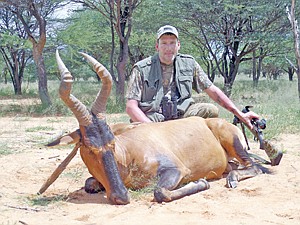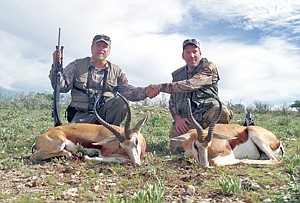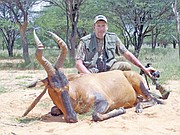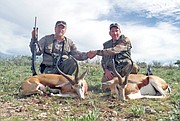Man hunts game in Africa
Kelley Brown was attempting to take a nap when a knock at his door followed by a question quickly awakened him – do you want to shoot a leopard?
It’s not a question Brown expected even while he was on a plains game hunt in Namibia, Africa. But it was the question he was asked part way into his 10-day hunt. Brown was excited, but had learned the right question to ask back – how much?
He was told it would be a $3,000 trophy fee to shoot the male leopard because, while a typical leopard hunt lasts several days and usually costs $18,000, this particular animal had killed a rancher’s cow. However, what Brown found out was that the leopard couldn’t be taken back to the United States.
“I said thanks for the offer, but that’s just a very expensive picture,” he said last week recalling his trip. “I was just there to shoot plains game and I didn’t expect anything else.”
Since he was a teenager, Brown has been reading about hunting in Africa and a month ago he finally got his chance to fulfill his lifelong dream. Brown traveled to Namibia, Africa for a 10-day guided hunting trip.
“It took a few days for it to sink in that I was actually finally there,” he said. “That I was finally hunting this game that I had been reading about for so long.”
“It definitely gets in your blood,” he said. “I was there for a once in a lifetime trip, but I’ll definitely be back.”
Brown took several animals including an oryx, blue wildebeest, springbok, impala, red hartebeest, eland and zebra. All of the animals, with the exception of the zebra, are types of antelopes or gazelles.
“The eland was probably the premiere thing that I shot,” he said. “I knew my general wish list, but it is hunting, so you can’t really be picky. I wanted a kudu, but we spent three days on that and didn’t get one. To me, all of them were neat.”
Hunting was done through a mixture of driving around in Toyota pickups and walking. The hunters, along with the guides, drive around to spot game, then hop out and stalk the game, often through the brush, for miles. Brown asked to spend as much time hiking as possible.
He was able to take his own firearm with him, but had to register it once he arrived in Africa. He used a Remington 7mm Magnum, which he said was appropriate for the plains game.
Brown is an avid hunter in Montana and has traveled to Florida to hunt alligators, but Africa was an entirely different experience.
“What was surprising to me was how challenging the hunting actually was,” he said. “The reason you are successful is the head trackers do this 10 months of the year.”
He said there is a large number of game, but because of predators all of the game has heightened awareness including great eyesight and hearing, making it challenging to actually shoot.
“That was a pleasant surprise that it was challenging,” he said. “The shear variety of game and the amount of it is incredible.”
Brown purchased a basic hunting trip through a Friends of NRA fundraiser and then he added on days to his trip. His hunting partner, Lance Oesau, joined him on the trip and got the opportunity to shoot a lion.
The trip was through Christie’s Adventures, which provides base camp accommodations and meals, along with guide services for the hunt, and access to private land for hunting in the north central part of Namibia.
“Hunting is a big economic driver in Namibia,” he said. “Especially out in the rural areas.”
While Brown was able to taste the game he shot, he wasn’t allowed to bring the meat back to the United States. For hunts that take place on private cattle ranches, the meat belongs to the landowner and it’s used to feed workers on the ranch. For hunts on tribal conservancy land, the meat stays with the tribe and is distributed among the native people. Trophy fees are distributed to various parties including the guides, landowner and the game department.
“There’s a value placed on the animals that keeps people from poaching,” he said. “They’re out there developing the water sources for the animals and don’t just see the wild animals as taking away resources from the cattle because a value is placed on that animal.”
In addition to seeing the different wildlife and landscape than at home, Brown also enjoyed experiencing the culture of the country.
“There was lots of giraffes and ostriches,” he said. “There was lots of giraffes that hung around, but there was one that had been hanging around close because the kids were feeding it apples.”
Hunts began early in the morning then Brown would return to the lodge for lunch. During the heat of the day he would try to get in a nap before going out again. However, the brick walkway outside his room made for a noisy surface on which the resident giraffe spent time walking around the lodge.
“He was a pest,” he said. “That giraffe would be out there clomping around, you couldn’t really sleep if you wanted to.”
At one bar he visited, Brown took a picture of the daily specials written on a chalkboard. The “bushman’s sosatie” included a selection of giraffe, zebra, kudu and oryx served with porridge and salad. Or diners could choose a zebra steak served with chips and salad.
Brown said he tried and enjoyed many different types of meat while there, but the oryx was his favorite, with a flavor he describes as a “lean tasty beef.”
While he was unable to bring home the meat, the animals he shot will be processed by a taxidermist and sterilized before being shipped to the United States. Brown expects his trophies to arrive in about three months and then he’ll have the mounts and rugs created.
Brown still has a hunting wish list. He’d like to go to Alaska to hunt interior grizzly and he’d like to bag an elk with his bow. There’s still game on his Africa list too.
“I still want to get a kudu and a warthog,” he said. “I’ve got a North American alligator, but I’d really like to get an African crocodile too.”





